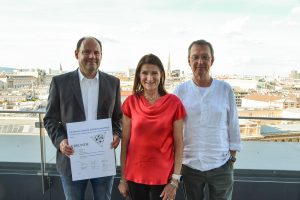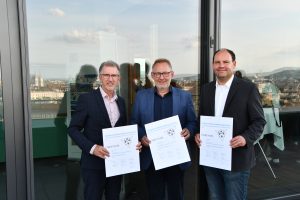The City of Salzburg’s “BONUS” consulting service convinced the jury of the Friedrich Moser Prize of the University of Technology Vienna. The FFG project with iSPACE-Lead is already being continued with the City of Salzburg in “BONANZA”.

Der Dekan der Fakultät für Architektur und Raumplanung Rudolf Scheuvens und Juryvorsitzende Helene Linzer gratulierten iSPACE-Studioleiter Thomas Prinz. Foto: Karl Heinz Porsch
Living in Salzburg has its price. Not only in monetary terms, but for every new construction site, land has to be sealed. But there are solutions: Together with the RSA FG and other partners, the City of Salzburg wants to exploit the potential of single family homes and semi-detached houses, which make up around half of all residential buildings in Salzburg. In the “BONUS” project, owners receive information on the sustainable and high-quality further development of their buildings or properties.
This project has now been awarded the “Friedrich Moser Prize 2024” by TU Wien, which iSPACE studio manager Thomas Prinz accepted in Vienna on behalf of the City of Salzburg. The prize was awarded for the fourth time in recognition of the work of the long-standing university professor Friedrich Moser (1926-2023), Emeritus for Local Spatial Planning. The award ceremony took place as part of the 50th anniversary celebrations of the Vienna University of Technology’s Local Spatial Planning research department.
Awards are presented to Austrian municipalities, planning associations, clubs and private institutions for outstanding achievements in the field of local spatial planning and urban design. The focus of the current competition was on the transformation and renewal of existing buildings.
Inward settlement development thanks to the use of existing buildings

Die Preisträger des Friedrich Moser Würdigungspreis Oskar Januschke als Vertreter der Stadt Lienz, Bürgermeister Klaus Falkinger aus Kleinzell im Mühlkreis und Thomas Prinz aus Salzburg. Foto: DI Karl Heinz Porsch
The creation of additional living space with low land consumption increases resource and space efficiency and supports inward settlement development, which the city of Salzburg has been committed to for many years. The BONUS consultation aims to take into account the individual needs of homeowners, develop their buildings in a space- and resource-saving manner and create new living space. Citizens are supported in recognizing the potential of their building or property and exploring available options. Previous consultations have shown that the problems and issues relating to the further development of buildings are highly individualized and the demands on the consulting team are correspondingly high.
At around 50 percent, the city of Salzburg has a high proportion of detached and semi-detached houses. “There is enormous potential for creating additional living space with these existing buildings,” says Andreas Schmidbaur, Head of the Spatial Planning and Building Department, “however, these buildings are predominantly privately owned. In order to mobilize this potential, a suitable offer is needed for owners to show them what opportunities there are for them to further develop their property if, for example, their living conditions or needs change.”
iSPACE studio manager Thomas Prinz emphasizes the added value of the project: “With the BONUS consultation, a tool has been created for the first time that can be used to initiate high-quality further development and the creation of new living space in existing detached and semi-detached houses.” iSPACE project manager Florian Schöpflin adds: “The consultation not only deals with structural options for creating living space, such as restructuring, dividing or redensifying buildings, but also provides integrated advice on the topics of energy-efficient renovation, mobility, green and open spaces and climate change adaptation measures.” In this way, BONUS advice can reduce underutilization of buildings and vacancies, upgrade existing structures and raise homeowners’ awareness of refurbishment, the mobility transition and climate change adaptation.
Three consecutive projects: BONSEI!, BONUS, BONANZA
The BONUS consulting service was developed as part of several FFG projects that built on each other. In the BONSEI! project, the necessary basic data and an initial draft of an innovative consultancy service for qualitative refurbishment in existing buildings were developed. In the follow-up project BONUS, the data innovations were further developed and expanded and the BONUS consulting service was developed and implemented in the city of Salzburg and in Feldkirch on the basis of pilot areas in test consultations. Due to the high level of interest, the advisory service was continued by the City of Salzburg after the project.
So far, 42 BONUS consultations have been carried out in Salzburg and there is currently a waiting list for a good ten consultations. In the current BONANZA project, the advisory service is being further developed with regard to climate change adaptation and biodiversity, the process for carrying out the BONUS advisory service is being further standardized and the transfer to new municipalities in Austria is being initiated. In addition, a monitoring system is being developed and integrated to assess the effectiveness of the advice and its implementation in the medium and long term.
The feedback from the advisory clients was extremely positive. They felt well understood and the content of the advice was communicated well. 90% of respondents stated that the information provided made a significant contribution and provided a basis for decision-making for future measures.
The further development of the BONUS consultation is being carried out in BONANZA with an interdisciplinary team of research and business partners and was also supported by social scientists. The consortium consisted of RSA FG Studio iSPACE (lead), Energieinstitut Vorarlberg, the City of Salzburg, Rosinak & Partner ZT Gmbh and Pulswerk GmbH.
“The City of Salzburg is keen to continue the BONUS consulting service after BONANZA, as it is a suitable way of mobilizing the potential that lies dormant in underused detached and semi-detached houses,” says Anna Schiester, Salzburg City Councillor for Planning and Building, discussing future plans. The BONUS consultation can effectively initiate further construction in existing buildings by creating high-quality living space through conversion, building division or redensification, taking into account energy efficiency, mobility, open/green space and climate change adaptation.

